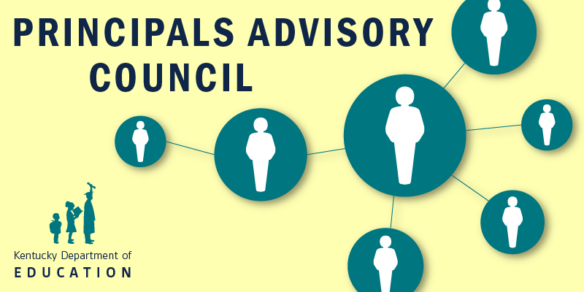 (FRANKFORT, KY) – Members of the Kentucky Department of Education’s (KDE) Principals Advisory Council (PrAC) heard updates on professional learning opportunities for school leaders during their meeting on March 14.
(FRANKFORT, KY) – Members of the Kentucky Department of Education’s (KDE) Principals Advisory Council (PrAC) heard updates on professional learning opportunities for school leaders during their meeting on March 14.
Emily Satterly, leadership development specialist in the KDE Division of Educator Preparation and Certification, provided information on a number of different initiatives, including the Principal Partnership Project’s (P3) cognitive coaching cohort. The cohort, called the Coach Approach for Principals, is designed to support principals in enhancing reflective leadership practices.
This week, the cohort met for two days in Frankfort and will have six more days in April and May before a new cohort begins in the fall. Satterly said information about the new cohort will be coming in a future edition of the P3 newsletter.
The P3 team also is working with the Kentucky educational cooperatives to kick off a new Statewide Principal Network. The first virtual meeting will be March 20 from 9 a.m. to noon ET.
“This collaborative support is specifically designed for principals and assistant principals to learn, problem solve, network and collaborate with other leaders in Kentucky, to hear and explore fresh ideas about real world challenges,” said Satterly.
Satterly said 158 school leaders have registered so far and anyone who is interested can go to the Statewide Principal Network registration form.
Satterly also provided updates on the new assistant principal cohort, which has been meeting regularly since Oct. 24. She said the goal is to give assistant principals the chance to network with other assistant principals, share ideas and build capacity around the Professional Standards for Educational Leaders.
Satterly said P3 leaders are also looking for feedback regarding what areas the assistant principal cohort should focus on in the coming year, if there are any areas of needed growth with assistant principals and if there are any other cohorts or professional learning opportunities that need to be explored next year.
Looking ahead to the 2024-2025 school year, Satterly said the P3 team will offer 10 in-person initial certified evaluation training dates with the assistance of the educational cooperatives, as well as four virtual training dates in the winter. Some dates have been set for certified evaluation update training, but Satterly said more will be set up in the next couple of weeks.
Kentucky Education Professional Standards Board
The council heard an update on recent actions from the Kentucky Education Professional Standards Board (EPSB).
Cassie Trueblood, policy advisor in the KDE Office of Educator Licensure and Effectiveness and lead counsel for EPSB, discussed actions taken by the EPSB during its meetings on Dec. 11 and Feb. 12.
To comply with federal regulations and the Individuals with Disabilities Education Act (IDEA), Kentucky will no longer issue emergency certificates for special education teachers beginning with the 2024-2025 school year. Under Section 612(a)(14) of IDEA and 34 C.F.R. § 300.156, special education teachers must have obtained full state certification as a special education teacher or be participating in a qualifying alternative route to certification. Trueblood explained there are temporary provisional certificates under alternative certifications Option 6 and Option 7 that will meet requirements under IDEA, but the emergency certifications are no longer an option.
Kentucky’s probationary certificates for special education also meet the certification requirements under IDEA. EPSB members approved an amendment to 16 KAR 2:160 which establishes the probationary certificate for teachers of exceptional children. The amendment removed the requirement for a teacher to complete nine hours of coursework before a probationary certificate can be issued. Now a teacher who holds a certificate in another area that has been hired to serve as a special education teacher can obtain a probationary certificate upon enrollment in an approved educator preparation program to add the new certification.
During the Dec. 11 EPSB meeting, members approved an extension of expanded assessment options for educators seeking a teaching certificate.
Last year, the EPSB approved a -1 standard error of measure (SEM) for the cut score for Praxis assessments. The EPSB also approved the use of the Praxis Performance Assessment for Teachers (PPAT) to meet the content and pedagogy assessment of 16 KAR 6:010. While both changes were due to expire on Dec. 31, 2023, EPSB extended the trial run for another year during the Dec. 11 meeting.
Also on Dec. 11, the EPSB approved the Praxis Teaching Reading: Elementary (5205) test as an effective evaluation of reading instruction knowledge and skills as required by KRS 164.306(2). Beginning in the 2024-2025 school year, new teachers seeking certification for teaching elementary school will be required to complete this assessment.
In other business:
- Interim Commissioner of Education Robin Fields Kinney provided an update on the 2023-2024 Commissioner Search;
- Annalee Jackson, a Leadership for Educational Equity (LEE) Public Policy Fellow in the KDE Office of Teaching and Learning, led the council through a discussion on educator well-being;
- Kristal Doolin, a deeper learning educational consultant from the Southeast South-Central Educational Cooperative, spoke to the council on how to use artificial intelligence (AI) as an educator and within the classroom; and
- Elly Gilbert, assistant director of the KDE Division of Educator Recruitment and Development, shared results of the 2023 Impact Kentucky survey.
The next scheduled Principals Advisory Council meeting is June 13.



Leave A Comment